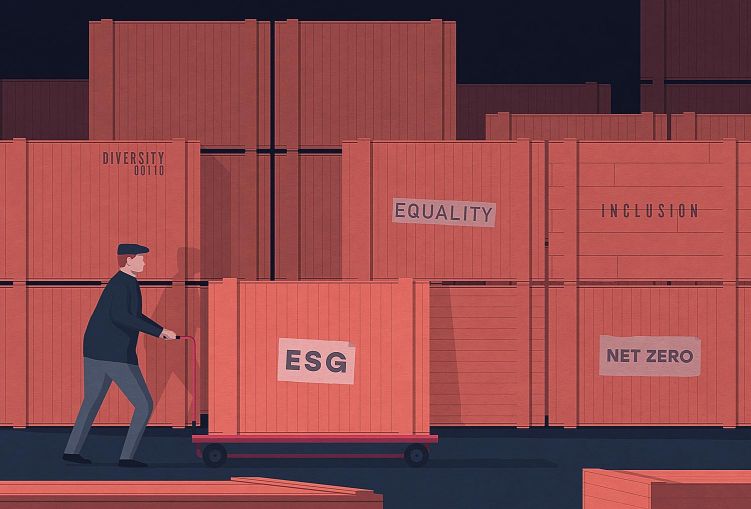ESG’s Staying Power Tested by 2023’s Economic Uncertainty
By Anna Staropoli February 8, 2023 7:00 am
reprints
ESG is bracing for a storm — and this time it’s not because of climate change.
Rather, the economy — in particular, speculation about a looming recession — is testing the resilience of the environmental, social and corporate governance (ESG) framework used by corporations to measure their societal impact.
The United States isn’t officially in a recession yet, but many economists suspect that we are headed in that direction or at least toward a slowdown.
The number of environmental and social initiatives along with diversity and inclusion programs have all skyrocketed over the last few years, but the economic uncertainty has sparked concerns about the long-term focus on ESG. Financial instability threatens 2023’s ESG goals, and, for many businesses, places corresponding efforts on the back burner. Whether and how ESG initiatives will weather a potential recession are questions as complex as the economic landscape.
Granted, commercial real estate is no stranger to instability. The 2007 financial crisis, not to mention 2020’s pandemic, primed the industry to expect the unexpected, but the current confluence of crises is unique.
During a World Economic Forum session in January on rebuilding cities, Maimunah Mohd Sharif, the executive director of the United Nations Human Settlements Programme (UN-Habitat), pointed to four concurrent crises that are happening right now: capital, COVID, the climate and conflict.
There is some benefit to lived experience, said Brandy Burdeniuk, director of ESG in North America at Avison Young, but no prior time frame quite encapsulates the hurdles of this present moment. “Who in their careers could go back to 2007, 2008, 2009 and point to four definitive things as disparate as that?” said Burdeniuk. “Even if one of those were happening right now, everybody would be speculating what the future could hold.”
In these circumstances, ESG initiatives can be deprioritized. The surging costs of property insurance and confusing patchwork quilt of local climate legislation have created additional — and expensive — layers to climate efforts. Meanwhile, companies whose social initiatives hinge on acquiring diverse talent have faced layoffs and tighter budgets.
In fact, ESG efforts aren’t just at risk; they’re on the defensive. “It’s not so much that we’re just hearing rumors [about the economy’s impact on ESG],” said Josh Richards, corporate director for ESG at Transwestern. “We’re actually seeing some of our clients taking those measures pre-emptively.”
Uncertainty is an important factor. Because economists don’t know whether to expect a formal recession or merely a controlled slowdown to reduce inflation, commercial real estate has opted to play things safe, said Richards. Investors, clients and asset managers have leaned into the economic uncertainty by readjusting and re-examining their asset hold strategies.
Larger dollar projects such as capital improvements and clean and renewable energy installations have taken the most significant hit. When money gets tight, loftier clean energy efforts are typically the first to go, thanks to the initial investment required.
Many large-scale and high-end climate undertakings won’t see paybacks for at least a few years, said Richards. Keeping extra cash on hand is a cautionary strategy, and some degree of slowing down is prudent, especially for companies that have short-term holds on their properties. But that strategy has resulted in less aggressive climate efforts.
A company’s strategy to pull back on ESG in this time of uncertainty isn’t unlike a family’s decision to postpone installing a backyard pool, said Richards. A pool may increase a property’s overall value, but the upfront dollar cost can be a shock to the wallet.
Likewise, environmental initiatives, like swimming pools, are still widely perceived as amenities rather than necessities.
“Many people still have the mindset that ESG efforts — especially things that have these direct returns in terms of energy efficiency, water efficiency, human health and wellness interventions within the buildings themselves — those tend to still feel like luxury purchases in some ways,” said Richards.
Climate efforts have therefore taken a back seat. Companies have either stalled their major climate plans or reduced their current efforts to the bare minimum — or both.
Yet doing something, even if the minimum, can still have a significant impact on a company’s finances. Local penalties loom as large as the federal interest rates, particularly in places like New York, where the consequences of Local Law 97 are slated to strike next year. Right now, real estate is looking to carry out ESG initiatives with the intent of avoiding fines and meeting compliance, rather than going the extra mile.
That’s not to say they’ve backed down from their longer-term commitments or their 2025, 2030 and 2050 goals, added Richards. “They’re really just weighing how feasible it is to potentially delay some of these [ESG] interventions while still meeting [climate] goals for 2030 if we have to take 2023 off,” he said, with the disclaimer that he’s neither an economist nor capable of predicting the economic future.
This holding period may be a strategic move for businesses, but it’s less strategic for the environment. “What we know — and I wish my math was wrong, I wish my peers’ math was wrong — we don’t have time to wait,” said Burdeniuk.
Keeping climate plans is also important from a business perspective, so that companies are ready when the economic situation improves.
Companies will fare best if they have budgeting, vendors, a time frame and even contracts and master service agreements already in place, said Richards. Planning for a period of greater economic stability will allow businesses to make midstream adjustments rather than waiting for the next five- or 10-year capital plan to get put in.
Social initiatives tell a similar story, if not a more successful one. Social issues have gotten unprecedented attention since 2020, when George Floyd’s murder spurred nationwide and industry-wide diversity, equity and inclusion (DEI) programs. Three years later, this period of economic instability is now testing how well those social efforts hold up during trying times.
“In real estate, we’ve never seen this amount of focus on the ‘S,’ ” said Cedric Bobo, co-founder of Project Destined, a company that mentors and prepares underserved youths for careers in real estate. “I don’t know how any organization like ours could have been prepared for the uncertainty that inflation created.”
History tells companies to be concerned about financial instability, said Bobo, noting that the current economic forecast ultimately boils down to perception versus reality.
“I just think the challenge is that people are facing budget crunches and they have to cut somewhere,” said Bobo. “And I think most of them don’t want to cut their budget, but they have to justify what they’re getting in return.”
Organizations like Project Destined maintain the dual philosophy of doing good while also doing well. Business can go hand in hand with social consciousness, so long as companies show the tangible outputs of their social efforts.
In this time of economic uncertainty, companies want to know the output of their initiatives. Over the last three months, Bobo has had more conversations with Project Destined’s partners about how to sustain social impact. Project Destined has turned to tracking and metrics to offer clients clear accountability.
Even amid the uncertainty, social initiatives seem to be faring better than ever — at least for businesses that have committed to DEI initiatives. Roughly 90 percent of Project Destined’s corporate partners increased their investment in 2023, Bobo said. Many also upgraded from one-year agreements to two- or three-year commitments.
Not all of Project Destined’s partners have moved forward, however — a loss Bobo doesn’t necessarily view as a negative.
“I think [the people who pull back] never had clarity of purpose for why they were doing it,” said Bobo. “They were just reactionary. They didn’t have a plan. They set up a DEI committee. The DEI committee didn’t have any clear goals. And then they ran into a downturn, and they just wiped it away because frankly it didn’t have substance to start.”
Diversity goals are never a bad idea, but the reactionary nature of 2020’s social efforts left the door open for empty promises. This current period of financial uncertainty is now distinguishing between companies that gave nothing more than their word and companies that have since given their time and resources.
“[This time period is] wonderful in a way because if you run at the first sign of business challenges that means you were never really in the game,” said Bobo. “You were just paying lip service to it to get through the moment.”
Pulling back on DEI efforts may even prove detrimental to business. Over the last three years, many companies have intertwined social efforts into their brand identity. Consequently, any kind of social regression is going to be noticeable, said Richards, forcing brands to examine the value of ESG.
Maintaining social traction, even in a possible recession, can therefore benefit companies — and it doesn’t have to prove challenging. Unlike climate efforts, social commitments generally aren’t as cost prohibitive, said Richards. Many initiatives can be managed internally through existing human resources departments or other company supports.
For proof, look at Project Destined’s partners. Yes, companies who recommitted to Project Destined are putting more resources into scouting diverse talent. But this commitment ultimately saves money elsewhere, shrinking budgets in departments like talent acquisition. Priorities have shifted to increase the return on investment, said Bobo.
Both brokerage JLL and multifamily giant Greystar have maintained their social focus despite economic turbulence, and both organizations have upped their commitment to Project Destined.
“We just want to ensure that the partnerships and the commitments and the dollars that we are spending are being used in the most cost-efficient, effective manner,” said Chris Drew, senior managing director, Miami office co-head at JLL.
Periods of economic instability force people — no matter who they are are or the company they work for — to evaluate any and all business expenses. It’s therefore prudent to ensure that the dollars spent are yielding a return on investment, said Drew.
He noted that this financial assessment isn’t different from how JLL traditionally operates business. Whether in a period of economic instability or stability, it’s important to evaluate where your money is going and how you can maximize your resources.
“We’re going to probably double down in the areas where we’ve seen the greatest success,” added Drew, “and I think we’ll look to re-evaluate other partnerships where we’re not seeing as much return on our investment, and to our commitment to what our collective goals are.”
Trying times create all the more reason to focus on social efforts. During periods of hardship, it’s especially crucial to ensure that a team feels comfortable and believes they belong, said Kacie Peltier, Greystar’s senior director of DEI, development and construction.
“Good times and bad, we’re always looking for the best talent,” said Peltier. “We want to make sure that we’re being super innovative with finding our talent, even if we do maybe happen to have less job openings at the time.”
Environmental efforts similarly provide value to businesses. ESG has become standard operating procedure for many properties, said Richards. The only lingering question in his mind is whether larger-scale investments will continue at the individual owner level.
Real estate doesn’t have to wait for a recession to end — or, in this case, to officially begin — to take advantage of economic opportunity. Unlike in the early 2000s, the world understands ESG from both the sustainability and social sides in a way it didn’t before, said Burdeniuk.
The industry also has better tools. Commercial real estate can now rely on financial modeling tools, as well as clearer industry standards and better benchmarking. Each of these resources helps companies improve the overall performances of their buildings, said Burdeniuk.
“I like to say, especially for folks that feel like they don’t align politically or their values don’t align with sustainability, the word ‘conserve’ is in the word ‘conservative,’ ” added Burdeniuk. “And so sometimes, in lean economic times, you get some really great problems solved that aren’t about how much money you spend but how you spend your money.”
The rising prices of building resources, for example, have made construction an expensive undertaking, said Burdeniuk. Yet while the surging costs of construction materials pose a financial difficulty, they simultaneously pose a question: If it’s all expensive, why not improve your return on investment and build to the environment’s benefit?
Right now, wood frame construction is nearly as expensive as high-performance, highly insulated buildings, said Burdeniuk. As the cost of resources escalates, the price differential shrinks and creates an opportunity for better building strategies.
“The positive spin on this [economic period] is that what we do matters,” said Burdeniuk, “and that even in recessionary headwinds and looming economic uncertainty, people are still seeing the benefits of moving forward with their ESG strategies.”
At its most optimistic, spending smarter — not harder — suggests that this period of financial uncertainty doesn’t have to be a complete loss. ESG initiatives may ebb and flow this year, but the economic uncertainty has done little to counter the importance of social and environmental efforts alike.
Burdeniuk summarized it best. “There is no real estate industry on a dead planet,” she said. That, at least, is a certainty.
Anna Staropoli can be reached at astaropoli@commercialobserver.com.


